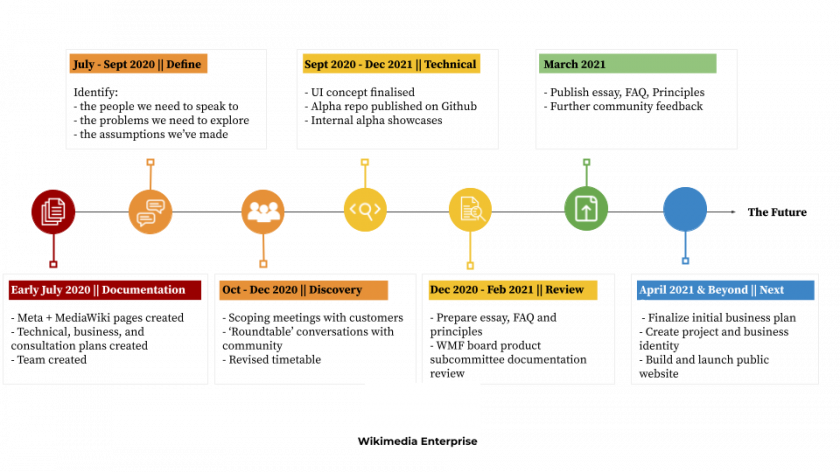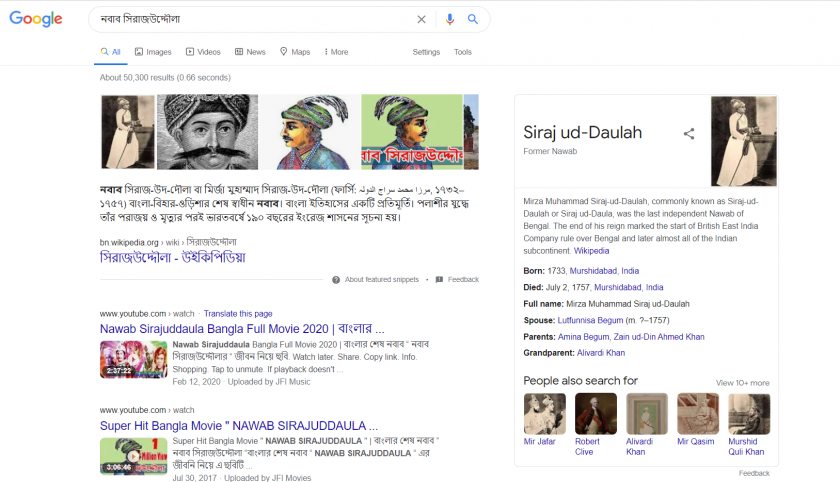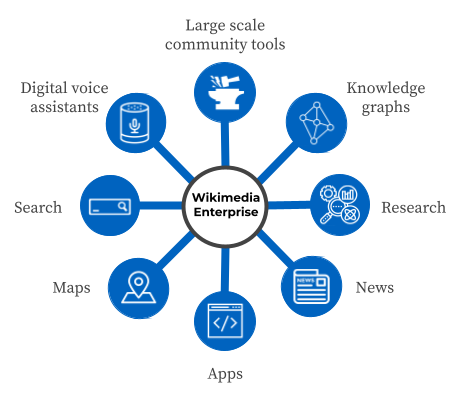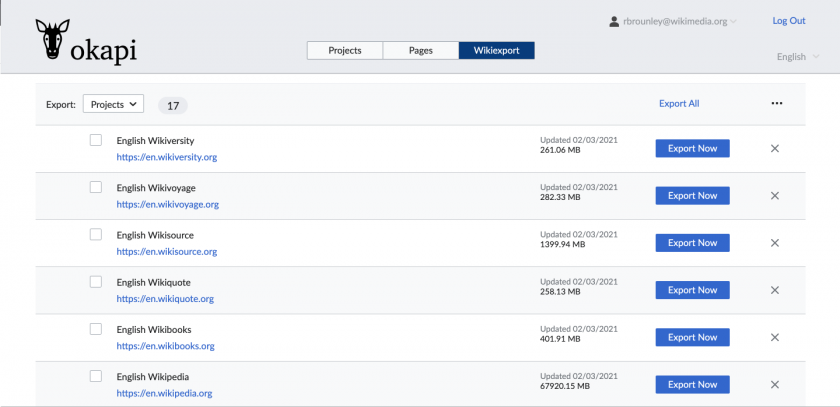Only a knowledgeable person knows about Wikipedia. Wikipedia is one of the many initiatives of the Wikimedia Foundation. Wikipedia or Wikimedia has always been free for everyone. Anyone can always access any information from Wikipedia or any image or video from any Wikimedia platform for non-profit purposes. This initiative is undoubtedly very great. But the big tech companies are making hundreds of millions of dollars using this free information from Wikimedia. But Wikimedia is not getting anything in return.
Wikimedia has taken the initiative to bring this inequality to an end. This time the Wikimedia Foundation itself is stepping down from its Wikipedia data to provide enterprise services.
Questions may arise in the mind of the reader. However, in order to eradicate all doubts, I would like to point out at the outset that the traditional Wikipedia used by us is not undergoing any policy or even practical change. Wikipedia remains as an open source source of knowledge as it once was. The Enterprise Project will not do any work on the original Wikipedia.
 Wikimedia Enterprise Emergence Tracking; Image Source: Liam Wyatt
Wikimedia Enterprise Emergence Tracking; Image Source: Liam Wyatt
How Wikimedia Enterprise will operate has not yet been finalized. However, the service may be available by the end of 2021, it has been announced. Big tech companies may have to pay hefty bills from Wikimedia this time around. Maybe competition in the world of information technology is going to be another turning point.
Information-based Internet service providers use Wikipedia in many ways. Google displays information cards at a glance in the search results of users on specific topics, which is called Google Knowledge Graph. In most cases, this knowledge graph is based on information from Wikipedia.
 Google's KnowledgeGraph on Sirajuddaula to the right of Google Search, created automatically using Wikipedia data; Image Source: Author
Google's KnowledgeGraph on Sirajuddaula to the right of Google Search, created automatically using Wikipedia data; Image Source: Author
Darius Zemielniak, a university professor and founder of a research association on digital society , said most Google users don't know, and many of the questions they ask come from KnowledgeGraph, Wikipedia. The bottom line is that Wikipedia's popularity has plummeted, with Wikipedia failing to form its own new grants, and even to create new volunteers. And Google, of course, is not alone. Just as web platforms have to deal with misrepresentation, Wikipedia has become a major source of truth.
In gratitude for Wikipedia's use of free information services, some companies have offered to donate to Wikipedia , while others have set up their own businesses without even bothering to inform Wikipedia. It's as if Wikipedia is working on an initiative.
Wikipedia ranks 13th in the world in terms of traffic. All of the 12 sister projects under the Wikimedia Foundation have been operating as nonprofits . With this vast website and all its global activities, about 400 employees are working in job related positions . The Wikimedia Foundation 's current budget of 130 million comes from user grants and funding from the Wikimedia Foundation. One big question is likely to be how the huge volunteer force of Wikipedia will react.
Wikimedia projects will be as free in the future as they were in the past. Opportunity to freely acquire worldwide knowledge has always been the main objective of the Foundation. This access or opportunity was not only available to the individual, but also to the machine or device. The opportunity to reuse Wikimedia content for free will remain the same.
As a result of this opportunity, most of the time, Wikimedia's content is intentionally used by profitable organizations according to their own business model, and again generates revenue from it. Except for voluntary corporate donations, Wikimedia has never received a return on the profits of these companies. Acknowledging this, the Wikimedia Foundation is focused on building enterprise-level APIs to make the knowledge movement more sustainable. For profit-oriented users, the Wikimedia Foundation guides the Wikimedia Movement Strategy process to avoid reliance on current types of revenue while simultaneously reducing other unnecessary external influences on product design and development.
 Wikimedia Enterprise Model; Image Source: Wikimedia.org
Wikimedia Enterprise Model; Image Source: Wikimedia.org
The Enterprise Project Team is working to create additional products, services and system components beyond the services and software currently available to users for a profit (for-profit reuser). Now that it's free, companies can continue to do so at no cost. The entire revenue from the Enterprise API will be used, with the main goal of Wikimedia in mind: for example, to run various Wikimedia programs or to increase Wikimedia's capabilities.
This project will usher in a new kind of activity for the foundation. In order to do what has been done so far, members of the Wikimedia community, the board and staff of the Wikimedia Foundation, researchers, and recyclers have been interviewed. The enterprise platform is primarily for large-scale users, who will work with a lot of information. Emphasis will be placed on features like access control, use of other software, and document management in the enterprise. However, this is not going to affect the editing experience of a Wikimedia editor. An editor or his bot can work as before.
 A sample image of how different files can be used on a large scale. Note that Okapi is the foreword given initially for the enterprise project; Image Source: Wikimedia.org
A sample image of how different files can be used on a large scale. Note that Okapi is the foreword given initially for the enterprise project; Image Source: Wikimedia.org
Wikipedia Enterprise will provide development tools (software) and services subject to cost to make it easier for different companies and organizations to access and reuse Wikimedia information .
Reasons to move towards value-based services
Sustainability
The Wikimedia 2030 Strategy was set out to determine the future goals of the two-decade-old knowledge movement . This strategy sets out the challenges that Wikimedia seeks to address. The goal of this movement is to create a platform that will provide open knowledge to the world. The components of this huge challenge are the lack of technology, the lack of knowledge, and the lack of access to knowledge.
From Wikimedia's proprietary perspective, this initiative is intended to keep the Wikimedia knowledge movement alive for decades to come. Facing any adversity and building a strong position to move towards the goal, the noble goal that was set 20 years ago in 2001. To meet the 2030 goal, Wikimedia needs more support, colleagues and allies. The key is to keep this support diverse, free, and neutral to the impact of any program. This is why it is important that Wikimedia's knowledge movement be sustainable so that it can stand on its own two feet now and in the future.
Own financing
If the Wikimedia API service is self-contained, full support can be provided for customers. In the long run, Wikimedia's existing infrastructure and peers will be able to focus on the efforts of the Wikimedia community and the openness movement. The cost of building the enterprise platform, expenses, ongoing management, and any additional costs will be met from own revenue.
Maintaining the independence of Wikimedia
The Wikimedia Foundation is primarily funded by its readers worldwide. An average of ১৫ 15 in grants is received from readers who subscribe to its banners and email applications. The model of this grant is the foundation's steady growth and independence. This year, an estimated 6 million readers will contribute to the Wikimedia Foundation.
Wikimedia has made it very clear, unsurprisingly, that this grant is the best and most important support for the movement. It is for this freedom that it is possible to carry out the work of serving the readers without any hindrance. If the Wikimedia Enterprise covers this grant significantly, Wikimedia must discuss the matter with its community and, if necessary, come out of it to keep the core movement free of influence.
It is also important to note that the small grant model is partly dependent on desktop and mobile traffic. Even as global access to the Internet continues to grow, Wikimedia's readership has remained virtually stable over the past few years. One of the biggest changes is that the growing interaction with Wikimedia content, which was supposed to be normal, is not happening on Wikimedia websites at a significant rate now.
The Wikimedia Foundation has marked this change since 2015. Since then, the fear is that it could seriously affect its ability to carry out long-term and ongoing activities. The more people use the content through Wikimedia's own website, the more the Enterprise API will be able to support it. The more versatile the sources of donations, the stronger the efforts to unify Wikimedia, even if the wikipedia.org domain traffic is reduced. The project therefore helps to ensure the financial sustainability of the knowledge opening movement.
Continue commercial investment in free knowledge services
It is important for businesses with large profits to acknowledge the free knowledge that Wikimedia is offering. Katherine Maher , Executive Director of Wikimedia , says , "It is our goal that everyone will use Wikipedia content or knowledge for free. Everyone will use, share, contribute and make it a collaborative effort. In addition, we inspire different businesses." People who use Wikimedia content should also contribute to the sustainability of it by making some return contributions. " Among the companies that are corporations, their grants are only 4 percent . The list of top corporate donors is a bit surprising. Top Grant Donors for FY 2017-2018:
- Google (1 million)
- Humble Bundle (৬ 458,000)
- Craigslist Foundation (250,000)
- Cards Against Humanity (35,000)
Wikimedia Enterprise's agreement with large-scale profitable users will further the Wikimedia movement. This further strengthens the confidence of the general public in the enterprise not to use grants.
It is hoped that Wikimedia Enterprise will continue to play a positive role in advancing knowledge and achieving the 2030 goal of making knowledge accessible to all for free. Enterprise.wikimedia.com, the homepage of the enterprise project , congratulates the reader on catching a difference. The domain of all Wikimedia sites is .org but in this case .com. Since Wikimedia Enterprise will operate under a completely separate infrastructure, separate policies and controls, it is not subject to the org domain to eliminate any ambiguity. That is to say, there is so much caution in the idea that the two should not be confused with the people.











Comments (0)